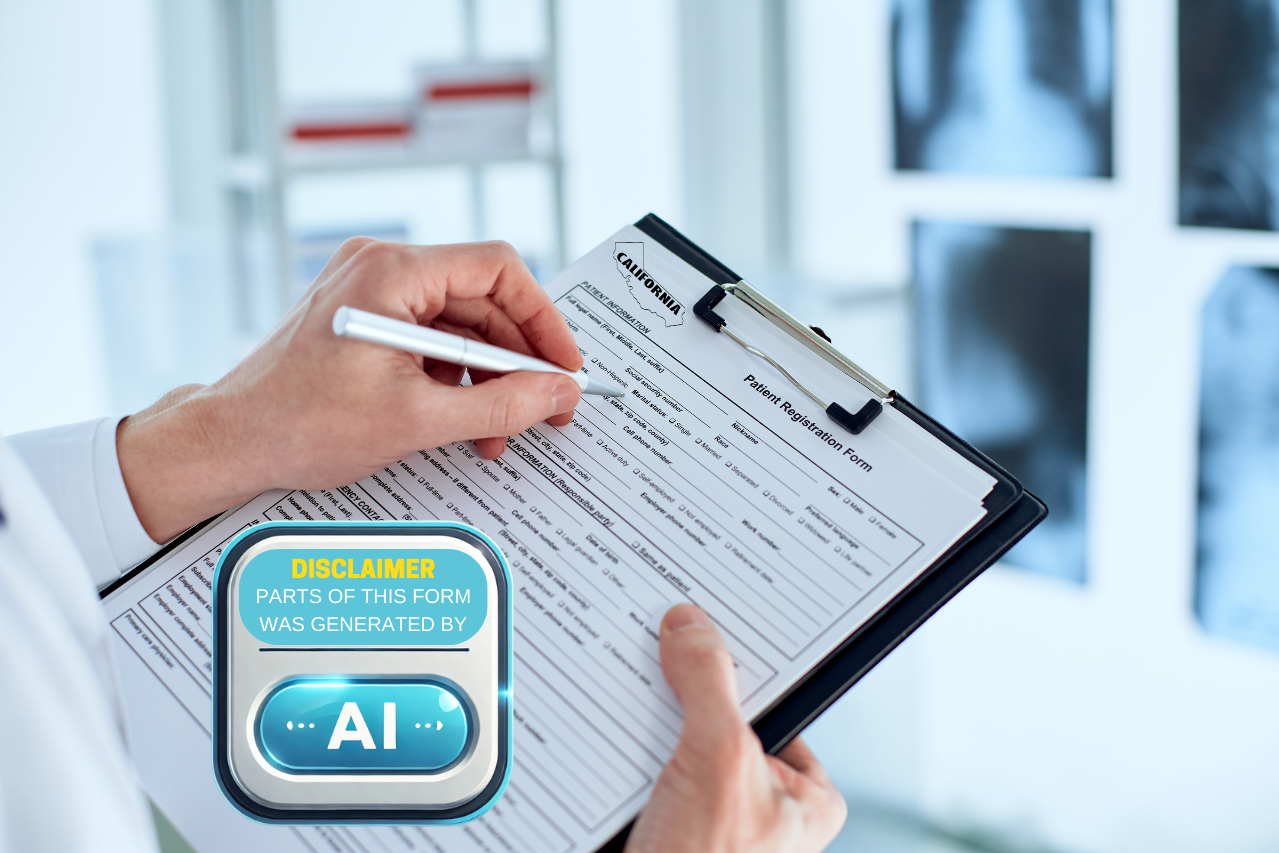California is taking a significant step toward regulating artificial intelligence (AI) in healthcare with the introduction of Assembly Bill (AB) 3030. Starting January 1, 2025, healthcare facilities, clinics, and physician practices in the state will be required to disclose their use of generative AI (GenAI) in patient communications that involve clinical information. This new legislation, signed into law by Governor Gavin Newsom in September 2024, is part of a broader initiative to establish transparency, accountability, and informed decision-making in the application of AI technologies.
Key Requirements of AB 3030
Under the provisions outlined in Health & Safety Code §1339.75, healthcare providers utilizing GenAI for communications involving patient clinical information must include the following in those communications:
- AI-Generated Disclaimer: A statement clearly indicating that the communication was created using GenAI.
- Human Contact Information: Detailed instructions on how patients can reach a human healthcare provider, staff member, or an appropriate representative.
The requirements are tailored to the medium of communication:
- Written Communications: The disclaimer must be prominently displayed at the beginning of each physical or digital correspondence, such as letters or emails.
- Audio Communications: The disclaimer must be verbally provided at both the start and conclusion of the interaction.
- Video and Chat-Based Communications: In cases of video or continuous online interactions (e.g., telehealth chat systems), the disclaimer must remain clearly visible throughout the interaction.
Scope and Exceptions
These regulations apply specifically to communications involving “patient clinical information,” defined as information related to a patient’s health status. Administrative communications, such as appointment scheduling or billing, are exempt. Additionally, if a licensed or certified human healthcare provider reviews and approves the AI-generated communication, the disclaimer and contact instructions are not required.
Enforcement and Penalties
Non-compliance with AB 3030 will carry serious consequences. Healthcare facilities and clinics may face fines and potential licensure actions, while physicians could face disciplinary measures affecting their medical licenses.
Why AB 3030 is Necessary
The introduction of AB 3030 reflects the growing integration of generative AI (GenAI) into healthcare, a sector where precision, trust, and human oversight are paramount. Generative AI is increasingly being used to streamline operations and enhance patient care. Examples of its applications include:
- Discharge Summaries: AI tools can automatically generate summaries of a patient’s hospital stay, detailing treatments, medications, and follow-up instructions.
- Telehealth Responses: Chatbots powered by GenAI assist in providing initial consultations, answering common patient questions, and triaging symptoms.
- Personalized Patient Education: AI systems can tailor educational materials to individual patients, providing insights about their conditions, treatment plans, or medication regimens.
While these innovations offer immense potential for efficiency and accessibility, they also raise critical concerns that this legislation seeks to address:
Patient Trust
Patients must have confidence in the information they receive, especially when it pertains to their health. If communications are generated by AI, some individuals might feel uneasy about the absence of direct human involvement, leading to questions about the reliability or appropriateness of the content.
Potential Miscommunication
Generative AI, while advanced, is not infallible. It can occasionally produce incorrect, incomplete, or misleading information, particularly if not properly trained or supervised. In a healthcare setting, even minor inaccuracies could have significant consequences for patient outcomes.
Ethical Implications
Relying on AI to communicate clinical information raises ethical questions. For instance:
- Should patients always have the option to bypass AI and speak directly to a human provider?
- Are there scenarios where disclosing AI involvement might erode trust or cause confusion?
- How can healthcare providers ensure accountability when errors occur in AI-generated communications?
By requiring disclaimers and clear instructions for human contact, AB 3030 addresses these issues head-on.
The successful implementation of AB 3030 depends on collaboration among healthcare providers, policymakers, and technology developers. By working together, these groups can ensure the responsible use of generative AI in healthcare and foster trust, transparency, and accountability.
Healthcare Providers
Healthcare organizations and practitioners must begin preparing now to comply with AB 3030’s requirements. Key steps include:
- Conduct Internal Audits: Review current AI communication processes to identify where GenAI is being used in patient communications.
- Train Staff: Educate healthcare staff about the new requirements, including how to implement disclaimers and provide human contact options.
- Update Policies: Establish or revise policies to ensure that AI-generated communications meet regulatory standards while prioritizing patient trust.
- Test Compliance Systems: Run simulations or pilot programs to confirm that communications, whether written, audio, or video, adhere to AB 3030’s specific guidelines.
Policymakers
AB 3030 serves as a pioneering example of how to regulate emerging technologies in healthcare. Policymakers across the country and globally can:
- Study AB 3030’s Framework: Use this legislation as a case study to craft balanced regulations that encourage innovation without compromising patient safety or transparency.
- Engage Stakeholders: Collaborate with healthcare providers, AI experts, and patient advocacy groups to develop guidelines that address ethical, operational, and technical challenges.
- Monitor and Adapt: Keep track of the implementation of AB 3030, learn from any challenges or gaps, and apply those lessons to refine future AI legislation.
Tech Developers
AI technology companies have a critical role to play in ensuring their tools align with both regulatory requirements and the needs of healthcare providers and patients. To support responsible AI use:
- Design for Transparency: Build features that allow healthcare providers to easily add disclaimers and ensure patients are aware of AI involvement.
- Simplify Compliance: Develop intuitive interfaces and tools that help healthcare providers adhere to AB 3030 without adding unnecessary complexity to their workflows.
- Prioritize Patient Safety: Focus on accuracy, reliability, and ethical considerations when developing AI systems, ensuring that they complement human decision-making rather than replace it.
- Collaborate with End Users: Work directly with healthcare organizations to create solutions tailored to real-world use cases, promoting practical and effective adoption.
By mandating these disclosures, AB 3030 aims to ensure that patients are fully informed about the role of AI in their healthcare communications, aligning with broader efforts to regulate AI’s use in the medical field.
Are you interested in how AI is changing healthcare? Subscribe to our newsletter, “PulsePoint,” for updates, insights, and trends on AI innovations in healthcare.




